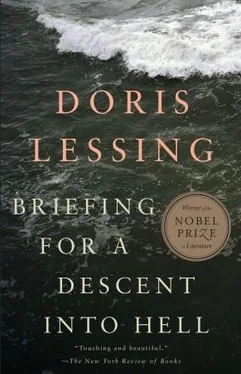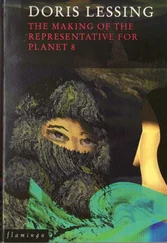1 ...7 8 9 11 12 13 ...54 Now it was not possible for me to leave the place. Before the sun had risen, I had intended to travel onwards to the mountains, but now this old place drew me. I could not leave it. And yet there seemed no place I could shelter. I walked back and forth for some time, while the sun rose up swiftly over the blue-green ocean. In my mind was a half thought that I might find a house or a room or something that might shelter me if it rained or blew too hard. And so it was. Where I had walked — or so I believed, but it was hard now to see exactly where I had moved, in so many stridings back and forth — but certainly where I had looked often enough, I saw ruins standing up from the earth, and when I walked towards them, saw that the mass of stone had once been a very large house, or a meeting- or storage-place. Dry stone walls were whole, reaching up perhaps fifty feet. The matching and working of the stone, which was of a warm earthy yellow, that stone which is time-hardened clay, was very fine and accomplished, with many patterns worked into it. The floor, only lightly covered with blown yellowy earth and rubble, was of a mosaic in blue, green and gold. I stood in a large central room, and doors led off at the corners into smaller rooms with lower walls. But there were no roofs or ceilings. I walked back and forth over the patterned floor, between the many and various walls, and the place was whole, save for the absent roof, in whose place was first a clear sparkling blue, and then the sun itself, pouring down, so that the interior became all sharp black shadows and washes of golden light. There was not so much as a stone loose or fallen from the walls, not so much as a half-inch of mosaic lost from the vast floor. And yet I had not seen this building standing quietly among the coloured grasses. I walked to where the door had been, and looked out, and was not surprised at all to see that I was surrounded by the ruins of a stone city, that stretched as far as I could see from the top of these deep stone steps. Trees grew among the buildings, and there had been gardens, for there were all kinds of flowering and scented plants everywhere, water channels ran from house to house, their cool stone beds still quite whole and as if invisible workmen maintained them. I now had a wide choice of buildings of all kinds for my home, but there was not a roof among the lot of them. Probably these buildings had once been thatched? This sharp tender young grass became, as it aged, the wiry-stemmed reed man uses for thatching? What kind of city was this which was in such good preservation that it seemed it was inhabited by friendly hardworking ghosts — and yet had no roofs? And what stone city of such size and magnificence ever has had thatched roofs?
I chose a smaller house than most, which had a rose garden, and water running everywhere, both in closed and in open channels. It was almost on the escarpment’s edge, and from it I could see clear across to the sea and to the sky, so that the eye made a slow circuit, from the rocky falls beneath the glassy cope, to the falling waters, to the deep shady forests, the beaches, the ocean, the sky, and then the gaze travelled back along the path of the sun until it was staring straight upwards, and flinching because of the sun’s fierce glare, and so it lowered again to my feet, which were planted on the very edge of the cliff.
What should I roof my new home with? This question answered my other: What had the original inhabitants used as roofing? Clay was the answer. Between the stones of the old foundations and the stone channels, the earth showed as clay. And when I splashed water on it, the dense heavy substance potters use formed at once in my palm. Once this city had had roofs of tiles made of this clay, and clay being more vulnerable to time than rock, these tiles had dissolved away in heavy rain or in the winds that must tear and buffet and ravage along this exposed high edge whenever it stormed. No people, where were the people? Why was this entire city abandoned and empty? Why, when it was such a perfect place for a community to make its own? It had good building material close at hand, it had houses of every kind, virtually whole and perfect save for the absent roofs, it had good pure water, and a climate which grew every sort of flowers and vegetables. Had one day the thousands of inhabitants died of an epidemic? Been scared away by threat of an earthquake? All been killed in some war?
There was no way of finding out, so I decided not to think about it. I would stay here a while. And I would not trouble to roof myself a house. The walls gave shelter enough from the sun. It was not yet the rainy season, but even if it had been, the rain would soon drain away off this height, and it was not a place to stay damp or cold.
I found a tree which had aromatic foliage, something like a blue gum, but with finer leaves. I stripped off armfuls of the leaves and carried them to the shelter of a wall. With them I made a deep warm bed I could burrow into if the night turned cold. I picked some pink sweet fruit, in appearance like peaches, that grew bending over a water channel. I drank the water — and understood that my needs as an animal were met. I need do nothing but pick fruit and gather fresh leaves when those that made my bed withered. For the rest I could sit on the cliff’s edge and watch the clouds gather over the sea, watch the moon’s growing and declining, and match my rhythms of sleep and waking to the darkening and lightening of the nights.
And I need not be solitary. For this city had an atmosphere as if it were inhabited, as I’ve said. More, as if this city was itself a person, or had a soul, or being. It seemed to know me. The walls seemed to acknowledge me as I passed. And when the moon rose for the third time since I had arrived on this coast, I was wandering among the streets and avenues of stone as if I were among friends.
Very late, when the moon was already low over the mountains, I lay down on my bed of deliciously smelling leaves, and now I did sleep for a time. It was a light, delightful sleep, from which it was no effort to wake, and I was talking to my old shipfriends, George and Charlie, James and Stephen and Miles and the rest, and into this conversation came Conchita and Nancy, who were singing their songs and laughing. When I woke, as the sun came up shining from the blue-green sea, I knew quite clearly that I had something to do. My friends were all about me, I knew that, and in some way they were of the substance of this warm earthy stone, and the air itself, but it was not enough for me just to live here and breathe its air. I sprang straight up when I woke, driven by this knowledge that I had work to do, and went to wash my face and hands in the nearest water channel. I admired my fine mariner’s beard, and my hard dark-brown salt-pickled arms and face, ate more of the peachlike fruit, and walked out among the sky-roofed houses to see what I could see … it was very strange indeed that I had not noticed this before: among the buildings, in what seemed like the centre of the old city, what might very well have been the former central square, was an expanse of smooth stone which was not interrupted by flowers or by water channels. The square was perhaps seventy or a hundred yards across, and in it was an inner circle, about fifty yards across. It was a little cracked, where earth had settled under it, and some grass grew in the cracks, but it was nearly flat, and it waited there for what I had to do. I knew now what this was. I had to prepare this circle lying in its square, by clearing away all the loose dirt and pulling out the grass. And so I began this task. It took longer than it should have done, because I had no tools at all. But I tore off a strong branch and used it as a broom. And when the dirt was all swept away and the grass pulled up, I brought water in my cupped hands from near channels, and splashed it down. But this took too long, and then I searched until I found a stone that had a hollow in it which might have been used as a mortar for crushing grain once, and I used that to carry water. To clear and prepare that circle in the midst of the city took me nearly a week, during which I worked all day, and even at night when the moon came up. Now I lay down to rest between the sun’s setting and the moon’s rising, and worked on under the moon, lying down again to rest between moon-fall and sunrise, if there was this interval.
Читать дальше
Конец ознакомительного отрывка
Купить книгу










